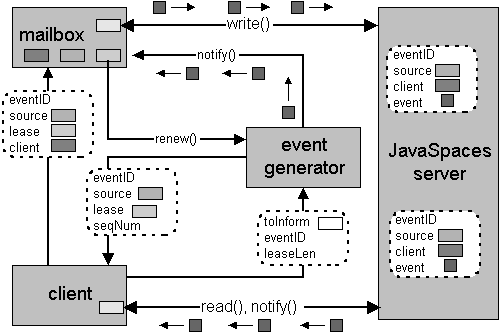|
|
|
Sponsored Link •
|
JavaSpace interface
JavaSpace InterfaceJavaSpace interface
JavaSpace object from a Jini lookup service,
RMI registry, ...

net.jini.core.entry.Entry (which extends
java.io.Serializable)
ChatMessage Entry 1 // In file
2 // JavaSpaces/ex1/com/artima/chat/entry/ChatMessage.java
3 package com.artima.chat.entry;
4
5 import net.jini.entry.AbstractEntry;
6
7 public class ChatMessage extends AbstractEntry {
8
9 public String chatRoom;
10 public String author;
11 public Long position;
12 public String content;
13
14 public ChatMessage() {
15 }
16
17 public ChatMessage(String chatRoom, String author,
18 Long position, String content) {
19
20 this.chatRoom = chatRoom;
21 this.author = author;
22 this.position = position;
23 this.content = content;
24 }
25 }
public Lease write(Entry e, Transaction txn, long lease)
throws TransactionException, SecurityException,
java.rmi.RemoteException;
null fields act as wildcards
ChatMessage m = new ChatMessage();
m.chatRoom = "AutumnLeafCafe";
m.position = new Long("19");
public Entry read(Entry tmpl, Transaction txn, long timeout)
throws UnusableEntryException, TransactionException,
SecurityException, InterruptedException,
java.rmi.RemoteException;
JavaSpace.NO_WAIT: don't wait at all
public Entry readIfExists(Entry tmpl, Transaction txn,
long timeout) throws UnusableEntryException,
TransactionException, SecurityException,
InterruptedException, java.rmi.RemoteException;
readIfExists() also reads, but only blocks if
waiting for a transactional state to settle
public Entry take(Entry tmpl, Transaction txn, long timeout)
throws UnusableEntryException, TransactionException,
SecurityException, InterruptedException,
java.rmi.RemoteException;
public Entry takeIfExists(Entry tmpl, Transaction txn,
long timeout) throws UnusableEntryException,
TransactionException, SecurityException,
InterruptedException, java.rmi.RemoteException;
public EventRegistration notify(Entry tmpl, Transaction txn,
RemoteEventListener listener, long lease,
java.rmi.MarshalledObject handback)
throws TransactionException, SecurityException,
java.rmi.RemoteException;
MarshalledObject.equals())
equals() not used in matching
null is wildcard
equals() not used in matching
Animal matches a Dog, client will actually get
a Dog - no type truncation
equals() not used in matching
Point jobs
Point
PointColor entry to the space
PointColors, and records them

position field
NextMessageNumber, increment, write back
NextMessageNumber Entry 1 // In file JavaSpaces/ex1/com/artima/...
2 // ...chat/entry/NextMessageNumber.java
3 package com.artima.chat.entry;
4
5 import net.jini.entry.AbstractEntry;
6
7 public class NextMessageNumber extends AbstractEntry {
8
9 public String chatRoom;
10 public Long nextMessageNum;
11
12 public NextMessageNumber() {
13 }
14
15 public NextMessageNumber(String chatRoom,
16 Long nextMessageNum) {
17
18 this.chatRoom = chatRoom;
19 this.nextMessageNum = nextMessageNum;
20 }
21
22 public void increment() {
23 nextMessageNum = new Long(
24 nextMessageNum.longValue() + 1);
25 }
26 }
1 // Create the template for NextMessageNumber
2 NextMessageNumber template = new NextMessageNumber(
3 currentChatRoom, null);
4
5 // Create a transaction
6 Transaction.Created trans = TransactionFactory.create(
7 transMan, TIME_OUT);
8
9 // Renew lease on transaction
10 long expireTime = trans.lease.getExpiration();
11 Date date = new Date();
12 long currentTime = date.getTime();
13 long leaseLen = expireTime - currentTime;
14 if (leaseLen < TIME_OUT) {
15 leaseMan.renewUntil(trans.lease,
16 currentTime + leaseLen, null);
17 }
18
19 // Take the NextMessageNumber entry
20 NextMessageNumber nextMsgNumEntry =
21 (NextMessageNumber) space.take(template,
22 trans.transaction, TIME_OUT);
23
24 // Grab the next message number
25 myMessageNum = nextMsgNumEntry.nextMessageNum;
26
27 // Increment the number in the entry
28 nextMsgNumEntry.increment();
29
30 // Write the incremented number back to the space
31 write(nextMsgNumEntry, trans.transaction, Lease.FOREVER);
32
33 // Create the ChatMessage entry using the message number
34 ChatMessage msgEntry = new ChatMessage(currentChatRoom,
35 userName, myMessageNum, message);
36
37 // Write the chat message to the space
38 space.write(msgEntry, null, MESSAGE_LEASE_LENGTH);
39
40 // Commit the transaction
41 trans.transaction.commit();
Design Entry classes for a chat service. The chat service should
have the following features:
What you will be doing here is basically data model design, not object-oriented design. Even though JavaSpace entries are objects, because their fields are public, entries feel more like C structs or XML documents than objects in a typical object-oriented system. What you will be designing is the implementation of a Jini chat service object, not the interface. When a client invokes methods on the interface of chat service object, it will read, write, and take entries from the JavaSpace.
|
Sponsored Links
|